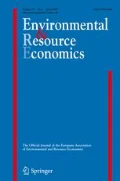Abstract
We model the evolution of a trans-boundary marine fishery, which is based on the harvesting of a single “highly-migratory” stock and is beginning to be impacted by regional oceanic-climate changes. The fish-stock’s range will be composed of a number of jurisdictional zones: namely, its intersection with the EEZ of each coastal country for which that intersection is non-trivial. There may also be a zone within international waters of the high seas. We also assume that management of the fishery is vested in a Regional Fishery Management Organization, whose members are countries that are “direct stakeholders” in the fishery—being either one of the above countries with jurisdictional authority in a zone or a country that has registered fishing vessels that are licensed to harvest in the fishery, or both. Our primary intended audience for the article includes the RFMO member-countries’ representatives, who participate directly in negotiations over RFMO policies, and also the RFMO’s scientific staff. Oceanic-climate changes are poorly predictable, but there will be periodic updates to enhance the available estimates. Consequently we believe that the RFMO’s efforts to cope with these changes would be helped by developing, as a tool, a certain type of a priori dynamic model, which could explore alternative long-time evolution paths for the bioeconomics of the fishery. The model should examine the immediate decisions made by the RFMO, and various possible long-term outcomes as these short-term decisions accumulate. Furthermore the model should be updated periodically, especially after new updated oceanic-climate predictions become available. In the article we work out a relatively simple example model, of an idealized fishery which is attempting to cope with a deteriorating oceanic-climate environment. But we also explain why (and in what ways) each particular real-world fishery’s staff needs to modify this generic example, to more closely match its own unique characteristics.



















Similar content being viewed by others
References
Clark CW (1990) Mathematical bioeconomics: the optimal management of renewable resources, 2nd edn. Wylie Interscience Inc., London
Clark CW (2007) The worldwide crisis in fisheries, economic models and human behavior. Cambridge University Press, Cambridge
Clark CW (2010) Mathematical bioeconomics: the mathematics of conservation, 3rd edn. Wylie Interscience Inc., London
Dixit AK, Robert S (1999) Investment under uncertainty. Princeton University Press, Pindyck
Fudenberg D, Tirole J (1991) Game theory. MIT Press, Cambridge
Golubtsov PV, McKelvey R (2007) The incomplete-information split-stream fish war: examining the implications of competing risks. Nat Resour Model 20(2):263–300
Hannesson R (2004) The privatization of the oceans. MIT Press, Cambridge
Korolev YM, Golubtsov PV (2010) Two-level competitive structures in common resource development. Math Game Theory Appl 2(4):25–48 (in Russian)
McKelvey R, Miller K, Golubtsov PV, Revisited Fish Wars (2004) A stochastic incomplete-information harvesting game. In: Weaseled J, Weimar H-P, Weaver RD (eds) Risk and uncertainty in environmental and natural resource economics. Edward Edgar, Cheltenham, pp 93–112
McKelvey R, Golubtsov PV (2006) The effects of incomplete information in stochastic common-stock harvesting games. In: Haurie A, Muto S, Petrosjan LA, Raghavan TES (eds) Advances in dynamic games: applications to economics, management science, engineering, and environmental management, AISDG, vol 8, pp 253–292
McKelvey R, Golubtsov PV, Miller K, Cripe G (2006) Bi-national management of a transboundary marine fishery: modeling the destabilizing impacts of erratic climatic shifts. In: Hannesson R, Barange M, Herrick SF Jr (eds) Chapter 9 in climate change and the economics of the world’s fisheries, pp 236–261
McKelvey R, Golubtsov PV, Miller K, Cripe G (2007) Chapter 10: The incomplete information: stochastic split-stream model—an overview. In: Bjorndal T, Gordon DV, Arnason R, Sumaila UR (eds) In advances in the economics of the fishery: papers in honor of Professor Gordon Munro. Blackwell, Oxford, pp 159–183
McKelvey R, Golubtsov PV (2011) An investment model of transboundary fishery management in an evolving oceanic climate, North American Association of Fisheries Economists NAAFE Forum, p 66
McKelvey R, Golubtsov PV (2014) The regional fisheries dynamic management game: oart one: the single-season subgame (forthcoming)
Miller K, Golubtsov P, McKelvey R (2011) Fleets, sites and conservation goals: game theoretic insights on management options for multinational tuna fisheries. In: Ommer R, Perry I, Cury P, Cochrane K (eds) Chapter 4 in world fisheries: a social–ecological analysis. Wiley-Blackwell, Oxford, pp 60–89
Squires D, Curtis R et al (2007) Fisheries buybacks. Blackwell, Oxford
Acknowledgments
Authors are grateful for financial support from NSF through the project “Sustaining Cooperative Multinational Marine Fishery Management in the Face of Environmental Variability” (Award No. 0323129) and from the Norwegian Research Council through the AGAMEM project (Grant No. 216571/E40).
Author information
Authors and Affiliations
Corresponding author
Additional information
The work was supported by the NSF Grant 0323129 and Norwegian Research Council Grant 216571/E40.
Rights and permissions
About this article
Cite this article
McKelvey, R., Golubtsov, P. Restoration of a Depleted Transboundary Fishery Subject to Climate Change: A Dynamic Investment Under Uncertainty with Information Updates. Environ Resource Econ 61, 19–35 (2015). https://doi.org/10.1007/s10640-014-9854-0
Accepted:
Published:
Issue Date:
DOI: https://doi.org/10.1007/s10640-014-9854-0




